Spotlight Sessions
Join us virtually as we shine a spotlight on an important area of focus in Jewish education, bringing together several scholars and/or practitioners with diverse perspectives for a shared conversation that will deepen our understanding.
These events are free and open to the public. Registration is required.
Missed an event? Subscribe to our YouTube channel to watch recordings of a large selection of past events, and to be notified when new recordings are posted, or listen to our podcast on your preferred podcast platform.
Upcoming Sessions
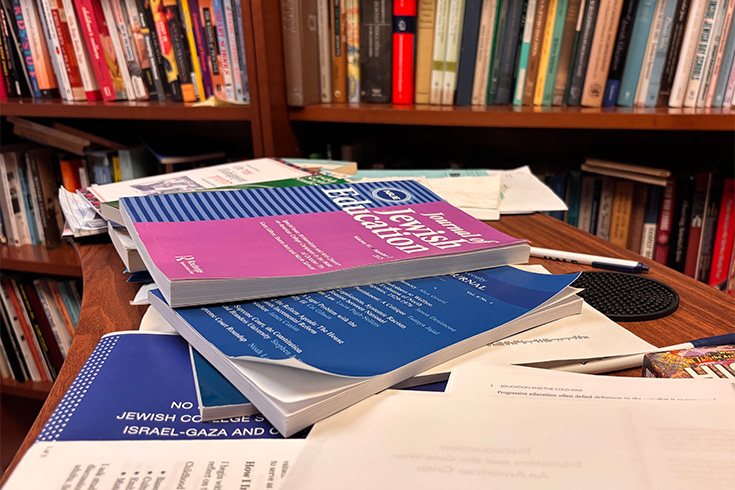
March 2, 2026
1 - 2:15 pm ET via Zoom
What, if anything, can be considered “best practice” in Israel education? What are the challenges of learning about Israel in every stage of life? In this session, we will explore what a team of scholars learned about research and practice in Israel education through a process of carefully sifting through the existing literature in the field. Through conversation, these experts will share what their experience writing a recent article in the Journal of Jewish Education taught them about building a knowledge base about Israel education, and about Jewish education more broadly.
Panelists include Alex Pomson (Rosov Consulting), Matt Reingold (Rosov Consulting), and Sivan Zakai (HUC-JIR), with Jonathan Krasner (Brandeis University).
Register for Spotlight on Israel Education Research here
Co-sponsored by the Mandel Center for Studies in Jewish Education at Brandeis University and the Journal of Jewish Education.
Past Sessions
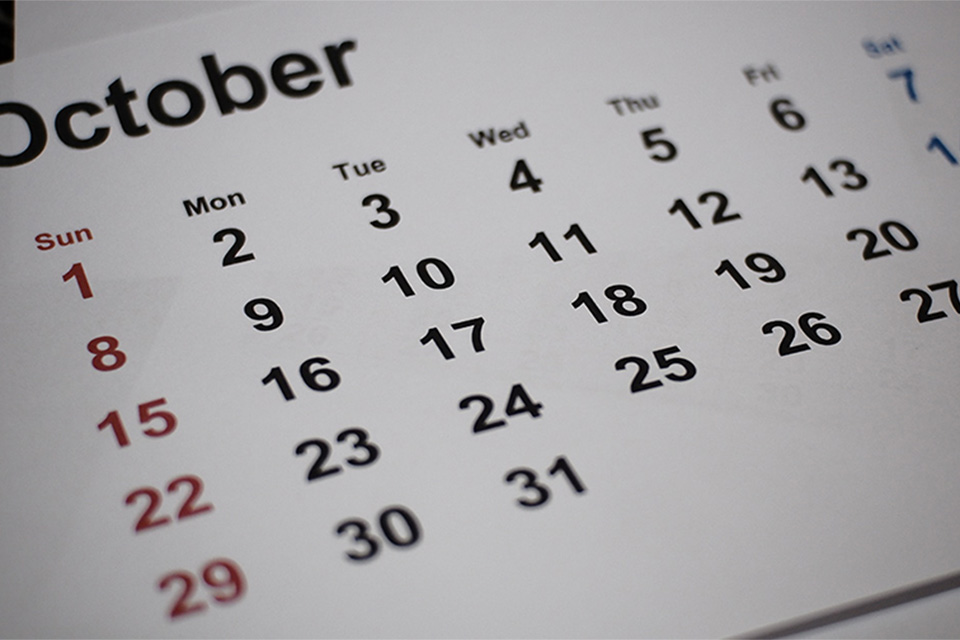
November 4, 2025
Two years after October 7, that date seems to mark a watershed in Jewish life around the world, including in North America. In this session, we explore how American Jewish educators and Jewish educational institutions have responded, how the changed environment has affected their work, and how they might need to think differently about the work of Jewish education in the days and years to come.
Panelists include Nina Bruder (Jewish New Teacher Project), Alex Pomson (Rosov Consulting), Matt Reingold (Rosov Consulting), Miriam Heller Stern (BJE: Builders of Jewish Education) with Jon Levisohn (Brandeis University).
Watch on YouTube: Spotlight on Jewish Education Two Years After October 7
Listen to Podcast: SPOTLIGHT ON JEWISH EDUCATION TWO YEARS AFTER OCTOBER 7
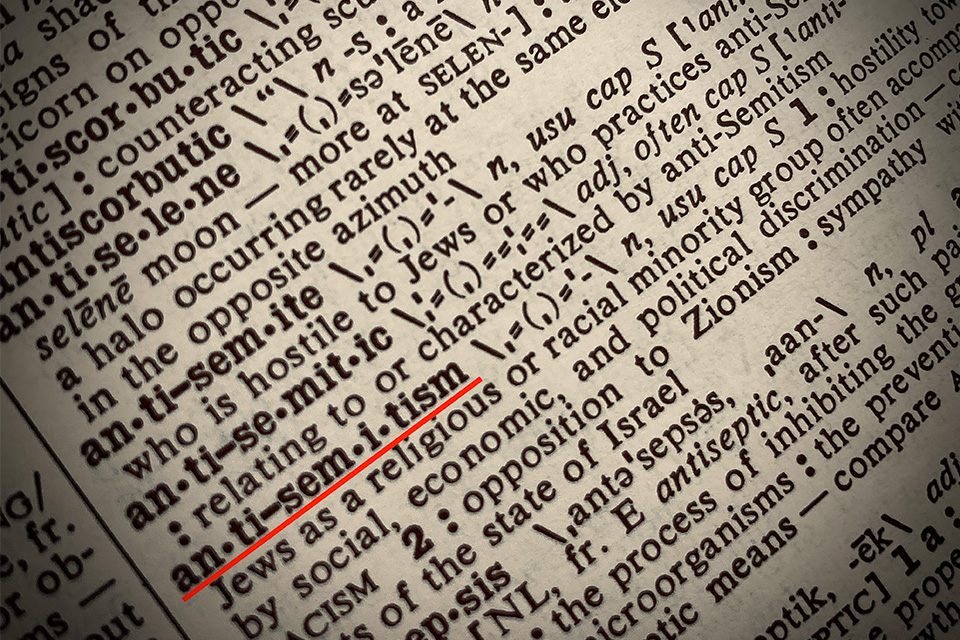
June 4, 2025
- Vikki Katz (Chapman University): Unsettled Ground: How Jewish Undergraduates are Negotiating Identity Shifts and (Un)civil Campus Discourse after October 7
- Rebecca Kobrin (Columbia University): Anti-Israelism, Social Media and the College Campus in the Aftermath of 10/7: The Case of Columbia
- Jonathan Krasner (MCSJE, Brandeis University): Between Home and Homeland: Jewish College Students Confront the Israel-Gaza Conflict and Campus Divides
- Graham Wright (Brandeis University): What Crosses the Line? Understanding the Boundaries of Antisemitism and Criticism of Israel Through the Perspectives of Jewish College Students
Moderated by Nicole Samuel (Brandeis University)
![]() Co-sponsored by the Mandel Center for Studies in Jewish Education at Brandeis University and the Journal of Jewish Education.
Co-sponsored by the Mandel Center for Studies in Jewish Education at Brandeis University and the Journal of Jewish Education.
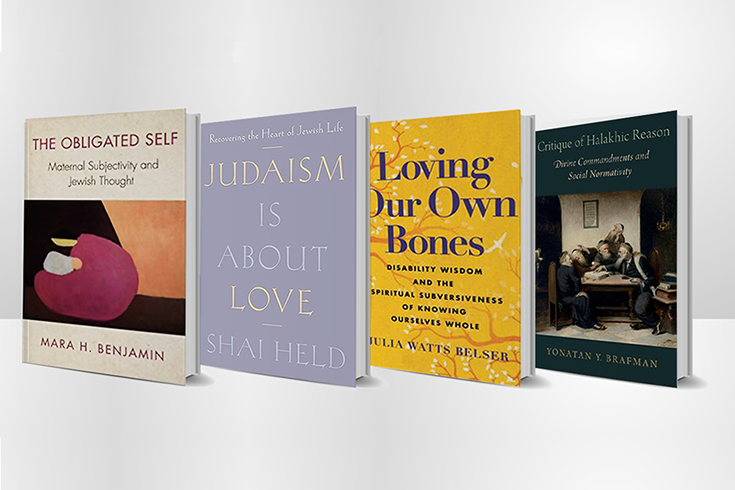
May 1, 2025
Recent years have witnessed an impressive outpouring of important new work in contemporary Jewish theology. In this Spotlight Session, we gather four leading scholars, each of whom has recently produced an important work of Jewish theology, to think together about the implications of their ideas for Jewish education.
This webinar features the following panelists in discussion with Jon Levisohn (Brandeis University) about their books:
- Julia Watts Belser (Georgetown University): Loving Our Own Bones: Disability Wisdom and the Spiritual Subversiveness of Knowing Ourselves Whole
- Mara Benjamin (Mount Holyoke College): The Obligated Self: Maternal Subjectivity and Jewish Thought
- Yonatan Brafman (Tufts University): Critique of Halakhic Reason: Divine Commandments and Social Normativity
- Shai Held (Hadar Institute): Judaism is About Love: Recovering the Heart of Jewish Life
Watch on YouTube: Spotlight on Contemporary Jewish Theology
Listen to Podcast: Spotlight on Contemporary Jewish Theology
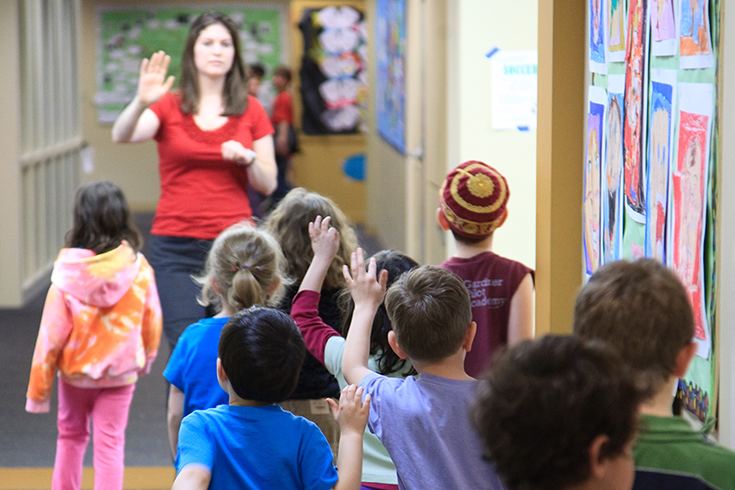
October 31, 2024
The attack on October 7th, the ensuing war, and the changed environment in the US have all led to questions about how American Jewish educational institutions have responded, and how they should. What do we know about the impact of the last year on schools, synagogues, camps, Israel trips, and other initiatives? How have educators been affected? How have children? What new trends are emerging? In this session, a group of scholars and educational leaders offer ideas for educators and educational institutions one year into this new environment.
Panelists include Jonathan Krasner (Brandeis University), Matt Reingold (community educator/independent scholar), Amanda Winer (research consultant), Sivan Zakai (HUC-JIR) with Jon Levisohn (Brandeis University).
Watch on YouTube: Spotlight on Jewish Education after October 7th
Listen to podcast: Spotlight on Jewish Education after October 7
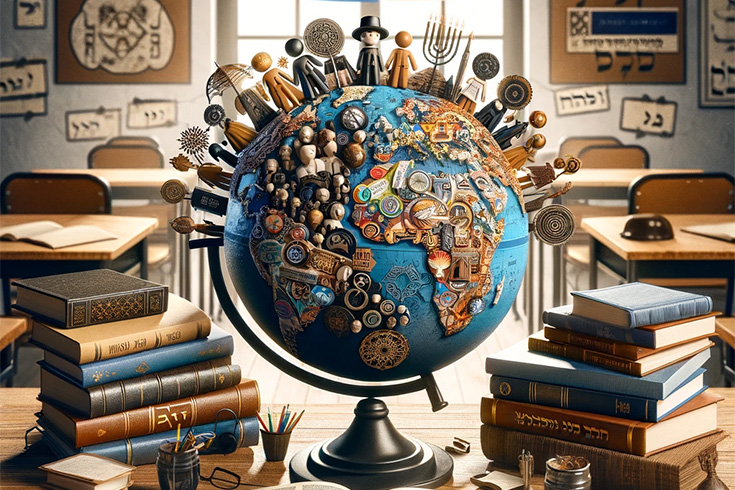
May 2, 2024
In this special event, authors from a recent themed issue of Journal of Jewish Education discuss their articles on race, ethnicity, and immigration in Jewish education. The issue spotlights the experiences of underrepresented individuals and serves as compelling testimony to the diverse array of Jewish experiences and identities, challenging prevailing norms about how Jewish educational spaces are designed and who benefits from them. This webinar features the following authors speaking about their papers:
- Hannah Kober ‘16 (Stanford University): A Fraying Connection: Israeli-American Perspectives on Diasporic Hebrew Learning Through and Beyond Jewish Education
- Marva Shalev Marom (The Schechter Institutes): Eat, Pray, Wait: The Informal Israeli Jewish Education of Ethiopian Youth Awaiting Aliyah
- Elana Riback Rand (Yeshiva University): “Realizing I’m Sephardi”: Navigating Prayer and Curricular Discontinuities in Majority-Ashkenazic Day Schools
- Ariela Ronay-Jinich (Olamim): Latin Jewish Families and Their Educational Choices: Navigating Multiple Identities
Moderated by Ilana Horwitz (Tulane University)
![]() Co-sponsored by the Mandel Center for Studies in Jewish Education at Brandeis University, the Grant Center for the American Jewish Experience at Tulane University, and the Journal of Jewish Education.
Co-sponsored by the Mandel Center for Studies in Jewish Education at Brandeis University, the Grant Center for the American Jewish Experience at Tulane University, and the Journal of Jewish Education.
watch on youtube: Race, Ethnicity, and Immigration in Jewish Education
Listen to Podcast: Race, Ethinicity, and Immigration in Jewish Education

February 29, 2024
For over a generation, many American Jewish young adults have spent a year between high school and college in Israel—the “gap year.” How does the gap year contribute to North American Jewish education? How does it complicate that work? What does it mean for young adults to go from “here" to “there" to participate in this important educational experience? What do we know about the spiritual, intellectual, and emotional growth of those who do a gap year? What are the elements that contribute to growth among participants in the gap year, and what are the impediments to growth?
This session brings together: Shalom Berger (Herzog College), Jonathan Schwab (Yeshiva University), Tilly Shemer (Shalom Hartman Institute), and Amy Weinreb (Masa Israel Journey) in conversation with Jon Levisohn.
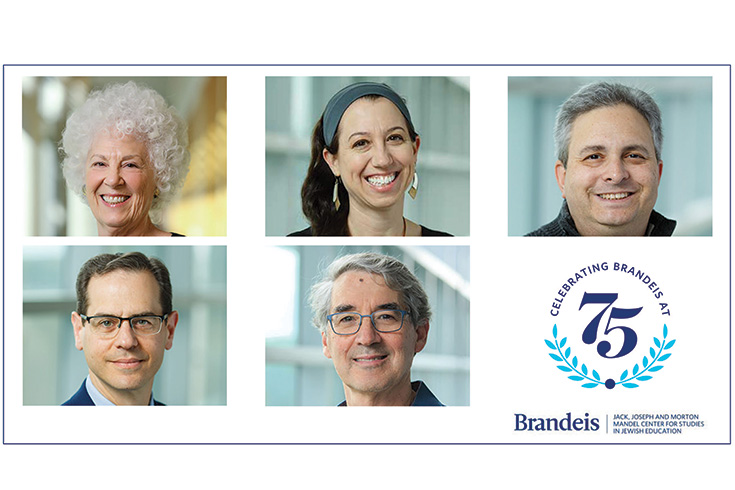
November 30, 2023
Panelists: Sharon Feiman-Nemser, Ziva Hassenfeld, Jonathan Krasner, Jon Levisohn, and Joe Reimer
What have we learned about Jewish learning in the past, where are we today, and what do we still need to learn for the future? Join MCSJE for this special Spotlight Session in honor of Brandeis University’s 75th anniversary, at which Brandeis scholars of Jewish education share some of the most important developments in the field of Jewish education and why they matter for the flourishing of individual students and the vibrancy of the Jewish community.

February 28, 2023
Mahloket — that is, dispute or principled debate — has long been celebrated as a Jewish ideal, not only within Jewish texts (where sages debate laws, interpretations and principles) but within the practice of engagement with those texts (where, for example, students might engage in debate about laws, interpretations or about principles). What does Mahloket look like at its best? How does Mahloket function as a kind of signature pedagogy (or at least a signature practice) within Jewish education? What does it mean to "educate for Mahloket" and what are the benefits and challenges of doing so? In what ways is Mahloket a model for substantive engagement across difference?
This session brings together: Aaron Dorfman (A More Perfect Union: The Jewish Partnership for Democracy), Robbie Gringras (educator, performer and writer For the Sake of Argument), Orit Kent (Pedagogy of Partnership powered by Hadar), Abi Dauber Sterne (For the Sake of Argument), and Mike Uram (Jewish Federations of North America), in conversation with Jon Levisohn (Brandeis University).
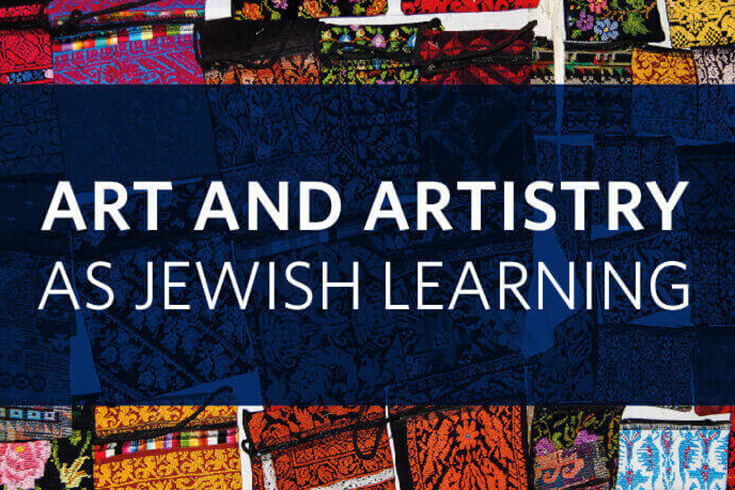
October 20, 2022
What is the relationship between art and artistry on the one hand, and Jewish education on the other? In what ways might we think about engagement with Jewish art and culture as a kind of Jewish learning? Building on the 2022 Mandel Center spring conference, Art and Artistry as Jewish Learning, this Spotlight Session brings together conference chairs Laura Yares (Michigan State University and director of the MCSJE project on Jewish Learning Through the Cultural Arts and Galeet Dardashti (NYU), along with Eva Heinstein (Mandel Foundation), Miriam Heller Stern (HUC), and Laura Mandel (Jewish Arts Collaborative), to explore these questions and their significance for the field of Jewish education.
Watch on youtube: Spotlight on Art and Artistry as Jewish Learning
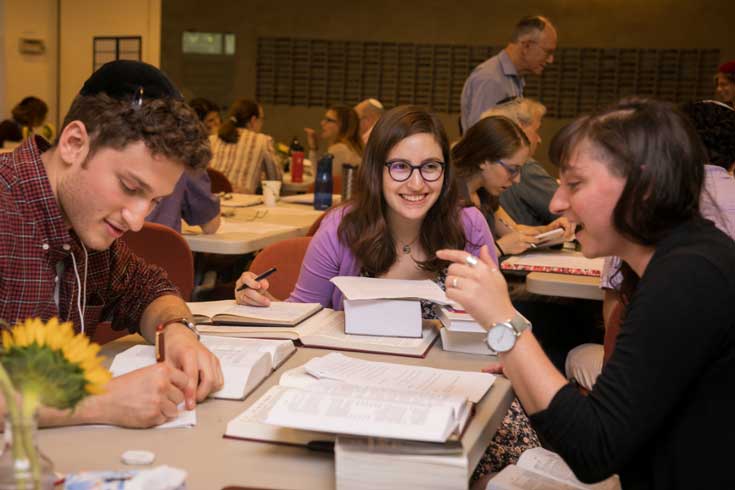
Photo Credit: Hadar
February 1, 2022
Rabbi Professor Jane Kanarek (Hebrew College), Rabbi Avi Killip (Hadar), Professor Barry Wimpfheimer (Northwestern), Sara Wolkenfeld (Sefaria), moderated by Professor Jon Levisohn (Brandeis University).
For decades following its invention in 1923, Daf Yomi was practiced by experienced, mostly haredi Talmud scholars, and criticized by many as well. Over time, the practice grew in popularity in that community. But in the 21st century, the practice has expanded dramatically, both in terms of the background of the participants and in terms of the very concept of what it means to "do the daf."
In this session, four highly experienced educators help us think about what Daf Yomi means, now, as a Jewish cultural or spiritual practice. What does it mean as a unifying practice (everyone who participates is "on the daf") that actually comprises many distinct and diverse practices? What does Daf Yomi represent, as a mode of engagement with the Jewish tradition that is both continuous and discontinuous with traditional modes of study? How does it bring people together in shared purpose? How does it meet individual needs or advance individual goals?
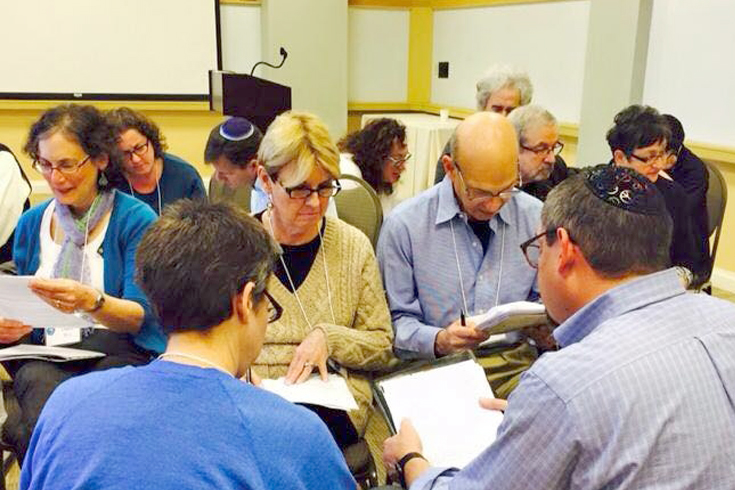
December 13, 2021
Sarra Alpert (Avodah), Rabba Yaffa Epstein (Wexner Foundation), Dr. Jane Shapiro (Orot: Center for Jewish Learning), Dr. Diane Tickton Schuster (Mandel Center for Studies in Jewish Education), moderated by Professor Jon Levisohn (Brandeis University).
Adult Jewish learning is flourishing in synagogues, JCCs, board tables, leadership cohorts, service cohorts and, of course, online. This session is an occasion to talk with a group of experienced educators about what they learned from their studies of adult Jewish learning opportunities — who the learners are, why they participate, what happens and how they grow or develop through the experience. It features insights gathered from the research they conducted for the Mandel Center's Portraits of Adult Jewish Learning project.